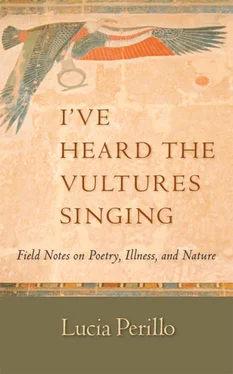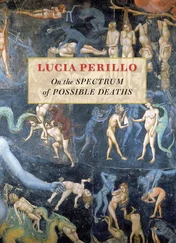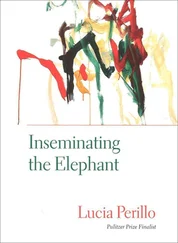“Fuck you, you bastard,” she says. “I’m going to kill you.”
“You try to fucking run me down I’m going to call the fucking cops.”
Their hollering echoes through the tidy yards, and what the world sends echoing back is a cop car. But its trajectory lacks the precision of the bats’. Instead, the cop swings too fast around the corner and almost crashes into another car. It’s almost shameful — how, by comparison, our human choreography has so little grace.
7
When I went back to the alley another night, the man who owned the stucco house with the saddle-shaped roof came out to ask what I was doing out in his backyard. It occurred to me how strange a sight I’d be in the darkness, skulking. You lose many possible identities when you start to use a wheelchair, and skulker is one of them. But, on the positive side, I am not feared. This guy knows that since I can’t climb his stairs, I cannot be a thief.
But he seems unsure. Perhaps he thinks the wheelchair’s just a gimmick.
He tells me that the bats fly over his shoulders every night when he sits out on his deck. He’s a hearty guy about my age, gesturing with his cigar. I explain how they use his alley as a route to the lake — isn’t that intriguing, the specificity of their choice? How it’s his alley that they prefer?
When he asks suspiciously why I’m so interested in bats, I take it as a code: What is this rogue apparition doing in my alley? My answer sidesteps him — I say only that I’ve been going on bat walks with the bat guy — because the answer is complicated, how I’ve been playing these games to plug the holes where I’ve been torn by what my Buddhist therapist calls the waterfall of jealousy and grief. How bats are supposed to make me not resent my friends who head off to camp in the mountains. The true explanation would take all night.
Pretty soon the bats have all flown on, and the homeowner, satisfied that I am harmless, snuffs out his cigar and retreats into the house. After that, it’s just my brain alone with a crescent moon, which I see hanging over the schoolyard when I climb back up to Rogers Street. It’s the kind of moon that makes me think of the scythe that Mr. Death’s supposed to carry. Except, tonight, Venus shows up too and hangs inside the blade.
8
Three weeks later the bat guy convenes us once again. When first we gather, there’s still enough light for me to write down flying foxes and interpretation of the teats. When someone asks about mating bonds, we’re told that bats are promiscuous. I write that down and then remember how Dracula seemed so chaste.
(Scientists discover that promiscuous males that have the biggest testicles also have the smallest brains. But I read about this later, when the winter torrents bloat the rivers as well as the soil that should be holding up the hillsides but does not, the bats gone off to hibernaculums where the females incarcerate the tiny ticking bombs of their eggs.)
This time I ask the bat guy how come he’s not afraid of rabies, my mother having sworn to a story about how a little girl died when a bat bit her in her sleep. Then he explains the reason for his bravado — he’s already had the rabies shots, so he’s immune. Good — I want the bats to be in some percentage rabid, some percentage dangerous, I don’t want them to be too tame. Instead, I want risk to be tonight’s blind date. For his part, I notice that the bat guy doesn’t like to talk about his day job doing something boring for the state.
This time the bats don’t slice through the group assembled between lampposts 43 and 44, even though we can see hundreds of them feeding on the lake when he shines his searchlight across the water surface. I’m disappointed, although on this night I’ve come to see them fly across the harvest moon, which rises directly above the Ramada Inn, full and crisp in its topography. Even without binoculars its bright mountains are visible, as well as its dusty-looking plains.
The bats hunt low on the water, but every now and again, looking through my binoculars, I’ll see one silhouetted by the moon’s low orange wafer, the bat flicking into the field of view for only an instant. Shocking more than eerie, because of how large it appears, its wingspan wide as the lunar surface. And because of how clearly I can see the skeleton that’s wrapped inside the frail skin of the wings. For one moment the bones hang motionless, caught as if by strobe-light. The body saying, however briefly, Here I am .
Brief History of My Thumb
I remember how it felt to get into the car. This was the part I liked best, the part when I was a little afraid.
To the driver — who was usually a man alone — my eyes gave just a flicker. Sometimes a woman would stop and I knew what was coming: a lecture about the risk. She was trying to save me, and who knows, she may have. The next car coming along might have belonged to the psychopath who would have killed me long ago.
In the beginning, it was me and my high-school friends who entered the cars’ sweaty interiors. We girls, and it was always girls, let ourselves be borne two miles up our town’s one road. We got out, crossed the road, and repeated the process on the southbound side. The point was not to go anywhere. Then what was the point? The answer I leave to Heraclitus:
The rule that makes
its subject weary
is a sentence
of hard labor.
For this reason,
change gives rest.
Heraclitus was the one who said famously that you can’t step into the same river twice. More precisely, he said (in Brooks Haxton’s translation) that just as the river he stepped into “is not the same, and is, so I am as I am not.”
A teenager likewise inhabits two states, grown and not, though I would have scorned anyone who identified me as a child. I was a match burning down to a black spindle. When I stood by the road, its ditch-wind fed me and made my little flame rise.
Later I moved not too far away from home, but to Quebec. I chose a foreign country to give my acquiescing to this conventional duty — going to college — a varnish of the exotic. I also wanted to escape my house where the televisions blared in every room and people screamed above them. The cars, by contrast, were calm places where I was almost always free to smoke cigarettes.
In Montreal, it seemed everyone smoked and everyone hitchhiked, because of a bus strike that went on for weeks. Beautiful women stood alone in the slush at the side of the road and stuck out their thumbs. I was sad to see the strike end and the sexy French women in their high-heeled boots suddenly disappear back to whatever swanky place they came from.
In my sophomore year I transferred to the agricultural college, whose buildings squatted in a wind-scoured pasture, flat as an airstrip, between two freeways. Quivering concrete ramps and roads led into the city thirty miles away. I cut my hair and wore a watch cap and down jacket, so that I looked like a husky boy. Dimly I was aware that I was acting out an archetype from old folk songs: that of the wife who goes to war or the pirate whose bound breasts are discovered after his death. When I stood at dawn on the elevated highways, the gusts of semis nearly blew me off my feet.
But in my youth I rode inside a bubble of luck: the worst thing that ever happened was that a man pulled out his penis. I started making up rules. Number One was to never look at the driver. Then he could have his penis out until the cows came home. Rule Number Two was not to get into cars with more than one man in them, because once, when I rode squashed in a car full of man-boys, one draped his arm across my shoulder, ostensibly to save space, and then let his hand droop until it touched my breast. Just the side, just through my shirt. He was daring me to scream. When I looked down, I found myself inappropriately dressed, as in a type of anxiety dream. I wore no bra, and the shirt’s crinkly green cloth, I realized, had shrunk a bit and puckered around each button to reveal a half-dollar-size glimpse of skin.
Читать дальше











![Various - Birds and Nature, Vol. 12 No. 5 [December 1902]](/books/745517/various-birds-and-nature-vol-12-no-5-december-thumb.webp)
![Various - Birds and Nature Vol. 11 No. 2 [February 1902]](/books/745533/various-birds-and-nature-vol-11-no-2-february-1-thumb.webp)